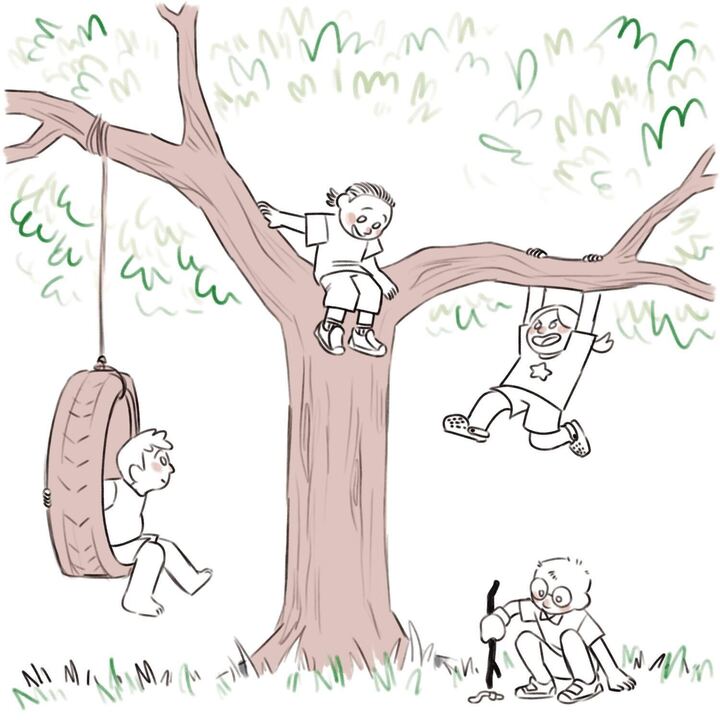Forum
Why do you hate kids?

Manuel Lopez | Staff Illustrator
Having worked with children for years and seen a plethora of hate for children across social media (and in casual conversations with peers), we’re concerned about people who viscerally dislike kids. Don’t get us wrong: It’s perfectly acceptable to not want children of your own. There are many practical reasons to remain childfree (finances, freedom, doubt that one can be a good parent, state of the world, etc.), in addition to not getting along with them.
But children are, by definition, underbaked people. They have little to no control over their emotions and often display horrible reasoning. They’re wrong most of the time and are usually too stubborn and egocentric to admit it.
We were all kids once. We are still the same people we were back then, no matter how much our personalities, capabilities, and preferences have changed. Though most of us probably can’t remember the frustration of lacking full motor control or the ability to regulate our emotions, we should be able to summon empathy for people who are experiencing what we once experienced. They are people despite having less skills and memories than we do.
Judgement
When talking to people who are genuinely annoyed by children, a wide consensus is that kids are insufferable largely because of their incapabilities. To some, the thought of a person not knowing how to cook their own meals or tie their own shoes is insane — even if the person in question is only eight years old. To others, the thought of a person being unable to process their emotions in the moment or reason through everyday plights is similarly frustrating — sometimes even more so when the person in question is a child.
We believe that this frustration stems from a place of judgement or a lack of understanding. The people who criticize children for not matching the physical and mental capabilities of the adults around them usually ignore the fact that children are still developing (i.e., they are quite literally meant to be dumber).
It is unreasonable to expect a person that’s only been on Earth for 10 years to have the same understanding of social and cultural nuances as some — not even all, heck, not even most — adults. “But wild animals are able to pop out of the womb and fend for themselves only days after being born!” Firstly, what? No, they aren’t. Secondly, do you hear yourself? We’re talking about people here, you know? The same species that requires about 25 years just for the front of their brain to fully develop?
Jealousy
A certain amount of discomfort might come from jealousy. Kids feel much more free to do whatever they want: They sing and dance without worrying what others will think, they express their emotions quite openly and say what they mean, and they don’t have to pay bills. Being a kid can seem easy, which makes it all the easier to react harshly to their misbehavior.
What do they have to worry about? A lot, actually. Remember that their world is smaller and every little thing feels as important to them as your big adult world feels to you now. Also, remember that you can sing and dance and express yourself if you want to. No one is stopping you!
A lot of people are annoyed not only by the lack of responsibility that sustains children’s freedom, but also the presence of their whimsy in general. Let’s be real: a lot of adults — us included — are miserable. A lot of people are uncomfortable by the sound of music or laughter or even talking (outside of the context of overstimulation) and this loathing usually stems from the hatred of oneself or personal qualities.
Self-loathing
It can be valuable to reflect on how you perceive your own childhood self. A lot of high school and college age people cringe at their middle- or even elementary-school selves, criticizing their overenthusiasm about a book series, their “clashing” style, the way they spoke — you name it. The sense of separation can make it feel easier to hate on a child that doesn’t feel like you, but they are. That is you, and you might be projecting unresolved feelings of shame onto other children who are just trying to live their best lives.
It’s okay to have made mistakes as a kid when you didn’t know any better (and even when you did). The fact that you have an adverse reaction now means you’ve grown, and that you have the power to forgive yourself. Take the opportunity to use that feeling of separation and give grace to both yourself and the kids who sit in front of you on an hour-long flight or who have trouble containing their reactions in the next booth of the restaurant.
People are not born fully realized. We should all understand that fact and extend more grace to the children around us. Also you’re hating on a four-year-old, but that’s how long it takes folks to go to college. Get real.
Signing off, Dion and River.
